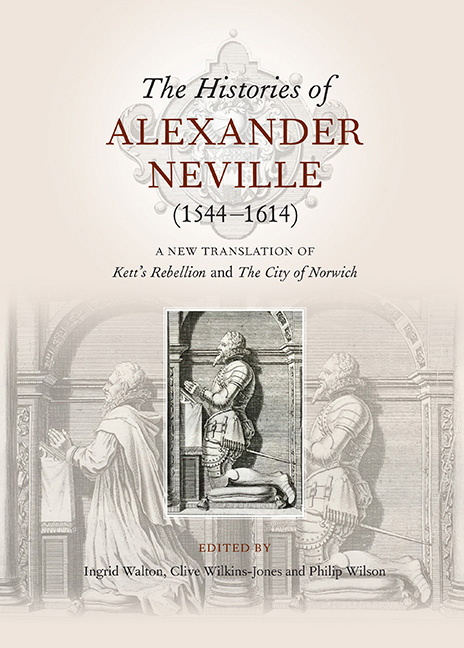 The Histories of Alexander Neville (1544–1614)
The Histories of Alexander Neville (1544–1614) Book contents
- Frontmatter
- Contents
- List of Illustrations
- Notes on the Editors
- Preface
- Acknowledgements
- Notes on the Texts
- Notes on Transcription
- List of Abbreviations
- Introduction
- De Furoribus Norfolciensium Ketto Duce: Kett's Rebellion (Text and Translation)
- Norvicus: The City of Norwich (Text and Translation)
- Nomina Praetorum: The Mayors and Sheriffs (Text and Translation)
- Appendix: Ad Walliae proceres apologia: A Reply to the Welsh Nobility (Text and Translation)
- Bibliography
- Index
Preface
Published online by Cambridge University Press: 24 October 2019
- Frontmatter
- Contents
- List of Illustrations
- Notes on the Editors
- Preface
- Acknowledgements
- Notes on the Texts
- Notes on Transcription
- List of Abbreviations
- Introduction
- De Furoribus Norfolciensium Ketto Duce: Kett's Rebellion (Text and Translation)
- Norvicus: The City of Norwich (Text and Translation)
- Nomina Praetorum: The Mayors and Sheriffs (Text and Translation)
- Appendix: Ad Walliae proceres apologia: A Reply to the Welsh Nobility (Text and Translation)
- Bibliography
- Index
Summary
This project originated with Clive Wilkins-Jones and evolved into an interdisciplinary collaboration. Its focus is the humanist intellectual, author and translator Alexander Neville (1544–1614). As long ago as 1942, the literary scholar C. T. Prouty, in his biography of Neville's friend the poet George Gascoigne, called for a study of Neville himself. More recently, David Womersley has called for further studies of individual historiographical works from the Tudor period. In response, we are presenting Latin transcriptions and modern English translations of the histories that Alexander Neville wrote for his patron and employer, Matthew Parker (1504–75), Queen Elizabeth I's first Archbishop of Canterbury, which were published in 1575.
Neville's account of Kett's Rebellion, De furoribus Norfolciensium Ketto duce, is the earliest printed account of the East Anglian commotion time of 1549. As such, it has tended to be viewed historiographically rather than from a literary perspective. There are two existing translations, and a third was begun by Frederic Russell but not completed. The earliest translation, from 1584 by Thomas Corbold, rector of Holkham in Norfolk, remains in manuscript. Richard Woods, rector of Frettenham, near Norwich, made another translation about ten years later, which he published in 1615. This version held a monopoly for some 400 years, almost supplanting Neville's Latin. No translation is definitive, however, and the ability to compare different renderings can prompt new insights. Moreover, the English of Shakespeare's day brings difficulties of its own to the twenty-first-century reader. A modern English translation alongside Neville's original text therefore seemed to us both desirable and somewhat overdue.
Norvicus has been largely ignored and never translated. Ostensibly a historiola [short history] of Norwich, it is equally – perhaps primarily – a rhetorical tour de force that serves to showcase Neville's considerable linguistic talents: an elaborate confection that plays with different forms and genres, aimed at a cultured domestic and European audience. As well as celebrating the life and work of Matthew Parker, it is intended to affirm English national identity and the Elizabethan Religious Settlement.
- Type
- Chapter
- Information
- The Histories of Alexander Neville (1544–1614)A New Translation of Kett's Rebellion and the City of Norwich, pp. viii - ixPublisher: Boydell & BrewerPrint publication year: 2019
